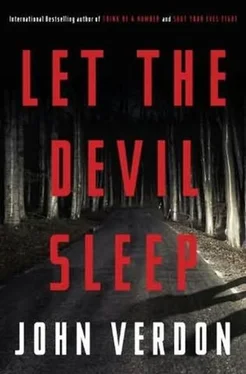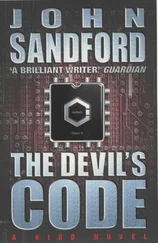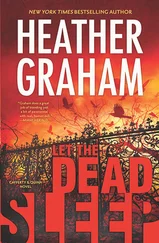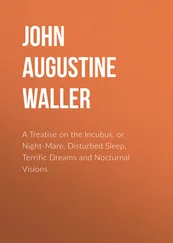Steeling himself, he picked up the sheaf of ten-year-old autopsy photos and chose the ones that documented the head wounds. Once again he found them horrific-the way the massive traumas distorted the facial features of the victims into grotesque facsimiles of living emotions. Once again the gross violation of their personal dignity outraged him, renewing his resolution to give them the respect they deserved-to restore, by bringing their killer to justice, the dignity that had been stolen from them.
That sense of resolution felt good. It felt purposeful, uncomplicated, energizing. But the good feeling soon began to fade.
As he looked around the room-this cold, uninviting, impersonal room that served as a man’s home-he was struck by the smallness of Max Clinter’s world. He couldn’t be sure what Clinter’s life had been like prior to his encounter with the Good Shepherd, but surely it had withered and contracted in the years since. This cabin, this little box perched on a mound of earth in the middle of a bog in the middle of nowhere, was the den of a hermit. Clinter was a deeply isolated human being, driven by his demons, by his fantasies, by his hunger for revenge. Clinter was Ahab. A wounded, obsessed Ahab. Instead of roaming the sea, he was Ahab lurking in the wilderness. Ahab with guns instead of harpoons. He was locked in his own quest, envisioning nothing but the culmination of his own furious mission, hearing nothing but the voices in his own mind.
The man was utterly alone.
The truth of it, the force of it, brought Gurney to the verge of tears.
Then he realized that the tears weren’t for Max.
They were for himself.
And it was then that the image of Madeleine came to him. The recollection of Madeleine standing on the little rise beyond the birch. On the little rise between the pond and the woods. Standing there, waving good-bye to him. Standing in that wild burst of color and light, waving, smiling. Smiling with an emotion that was far beyond him. An emotion beyond words.
It was like the end of a film. A film about a man who had been given a great gift, an angel to lovingly light his way, an angel who could have shown him everything, led him everywhere, had he only been willing to look and to listen and to follow. But the man had been too busy, too absorbed in too many things, too absorbed by the darkness that challenged and fascinated him, too absorbed by himself. And finally the angel was called away, because she had done all she could do for him, all that he was willing to allow done. She loved him, knew all there was to know of him, loved him and accepted him exactly the way he was, wished him all the love and light and happiness he was capable of accepting, wished him all the best of everything forever. But now it was time for her to go. And the film ended with the angel smiling, smiling with all the love in the world, as she disappeared into the sunlight.
Gurney lowered his head, biting his lip. Tears rolled down his cheeks. And he began to sob. At the imagined film. At the truth of his own life.
It was ridiculous, he thought, an hour later. It was absurd. Self-indulgent, over-the-top, hyperemotional nonsense. When he had time, he’d look at it more carefully, figure out what actually triggered his childish little breakdown. Obviously he’d been feeling vulnerable. The political dynamics of the case had isolated him, his imperfect recovery from his gunshot wounds had left him frustrated and touchy. And no doubt there were deeper issues, echoes of childhood insecurities, fears, and so forth. He would definitely have to take a closer look. But right now…
Right now he needed to make the best use of the time that was available to him. He needed to prepare himself for whatever confrontation might emerge from the process he and Kim had set in motion.
He began shuffling through the papers on the table, reading everything from summaries of the original incident reports to Kim’s status notes on her initial contacts with the families, from the Offender Profile generated by the FBI to the full text of the Good Shepherd’s Memorandum of Intent.
He read through all of it. Carefully, as though he were reading it for the first time. With frequent glances out the window at the causeway path and occasional trips around the room to check the other windows, the task consumed over two hours. And then he went through it all over again.
By the time he finished his second pass, the sun had gone down. He was fatigued from reading and stiff from sitting. He got up from the table, stretched, withdrew the Beretta from his ankle holster, and stepped out through the front door. The cloudless sky was in that stage of dusk in which the blue is fading to gray. Somewhere out in the beaver pond, there was a loud splash. And then another. And another. And then compete silence.
The quiet brought with it a feeling of tension. Gurney slowly circled the cabin. It all appeared unchanged from what he remembered from his earlier visit-except that the Humvee that had been parked out in back of the picnic table was gone. When he came around to the front, he went back inside, closing the door behind him but leaving it unlatched.
In just the three or four minutes he’d been outside, the light level had fallen noticeably. He returned to the table, laid the Beretta down within easy reach, and selected from the piles of papers his own list of questions about the case. The one that caught his attention was the same one Bullard had alluded to in Sasparilla and Hardwick had mentioned on the phone in connection with a hypothetical pair of motives Jimi Brewster might have had for killing not only his father but the other five victims.
Hardwick theorized that Jimi could have killed his father out of pure hatred for him and the materialistic priorities embodied in his choice of car, and killed the other five because they, with their similar cars, were just like his father. In that way there would have been one primary and five secondary victims.
However, although there was something tantalizing about the theory, it didn’t really jibe with Gurney’s knowledge of pathological killers. They tended to kill either the primary object of their hatred or a series of substitutes, not both. So the primary-secondary motivation structure didn’t quite…
Or did it?
Suppose…
Suppose the killer did have one primary target. One person he wanted to kill. And suppose he killed the five others not because they reminded him of the primary- but because they would remind the police of the primary .
Suppose he killed those other five people simply to create the impression of a different kind of crime. At the very least, those extra victims would clutter the field so thoroughly that it would make it impossible for the police, or anyone else, to see clearly who among the six the primary really was. And, of course, the way the Good Shepherd murder scheme had been engineered, the police would never even get to the point of asking that question.
Why would it occur to them that the six were really the sum of one and five? Why would they even start down that road? Especially if they had, from the very beginning, a solid theory of the case that made all six targets equally important. Especially if they’d received a mission killer’s manifesto that made all the murders make equal sense. A manifesto that explained everything. A manifesto so cleverly constructed and so reflective of the details of the crimes that the best and the brightest swallowed it whole.
Gurney had the feeling that finally he might be seeing something clearly-a sense that the fog was starting to lift. It was his first vision of the case that seemed, at least at first glance, coherent.
As with most of the insights in his career, his immediate thought was that it should have occurred to him sooner. After all, this way of looking at the murders was only a small turn of the dial from Madeleine’s description of that pivotal scene in The Man with the Black Umbrella . But sometimes a millimeter makes all the difference.
Читать дальше












